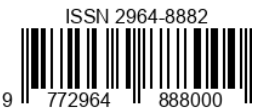PENERAPAN STRATEGI DAN KEBIJAKAN PENDIDIKAN AGAMA KRISTEN DALAM KELUARGA SEBAGAI UPAYA PEMBENTUKAN KARAKTER ANAK
DOI:
https://doi.org/10.55606/lumen.v1i1.58Keywords:
Strategy; Christian Religious Education Policy; Character buildingAbstract
Observing the news of crime committed by minors today certainly raises concerns and unrest in social life. The disturbing behavior of children, such as the behavior of children away from religious teachings, disrespecting their parents, dressing inappropriately, saying dirty words, smoking, and the most troubling thing is that children are now involved in criminal acts. This issue has become a hot topic that is often reported on television, such as news about crimes committed by students, violence against friends, brawls, rape, and even murder. Responding to the negative behaviors of children that often appear in the news of child crimes need special attention. Therefore, as a form of attention, it is necessary to first understand the condition of the child himself and his relationship with the surrounding environment, both parents and family as well as the school as the smallest unit in society that has the responsibility to help children grow and develop optimally. Parents are the first people to be known by children, the first people to give life understanding to children, so parents play an important role in the formation of children's character. However, ironically, the family becomes a source of threat and unrest for children, because of the wrong treatment given by parents to children. Basically, the relationship between children and their parents is an emotional and cognitive source for children. These relationships provide opportunities for children to explore the environment, including school and social life, and children's early relationships can serve as models for later relationships. This initial relationship begins when the child is born into the world, in fact it has started since the fetus was in the womb (Sutcliffe, 2002: 15).1. Furthermore, the role of Christian Religious Education is an effort made by educators continuously to equip students with sources of faith. Character formation is very important in the educational process which is a process of internalizing the values of the Christian faith through education. So that the personality or noble character of students is formed through habituation that is constantly practiced, without stopping.
References
Sutcliffe, J., (2002). Baby Bonding, Membentuk Ikatan Batin dengan Bayi. Jakarta: Taramedia & Restu Agung.
Pojok Bekasi, Jumat, 11 Maret 2022
Kompas.com, Sabtu, 21 Mei 2022
https://www.merdeka.com/peristiwa/terjadi-lagi-korban-begal-jadi-tersangka.html
Elizabeth B. Hurlock, Psikologi Perkembangan, (Jakarta : PT. Gelor Aksara Pratama, 2015), cet ke-5, h. 206.
https://kaltim.antaranews.com/berita/29577/rehabilitasi-sosial-bagi-anak-bermasalah-hukum
Sugiyono, Metode Penelitian Kuantitatif, Kualitatif Dan R & D, (Bandung: Alfabeta, 2013), 9.
Hengki Wijaya, Analisis Data Kualitatif Ilmu Pendidikan Teologi, (Makassar: Sekolah Tinggi Theologia Jaffray Makassar, 2018), 88.
Tim Penyusun KBBI, “Strategi” dalam Kamus Besar Bahasa Indonesia (Jakarta: Balai Pustaka, 2002), 1092.
Syaiful Bahri Djamarah dan Aswan Zain, Strategi Belajar dan Pembelajaran (Jakarta: Rineka Cipta, 2002),
Sidjabat, B.S. (1993). Mengajar Secara Profesional: Mewujudkan Visi Guru Profesional, edisi revisi, Bandung: Yayasan Kalam Hidup.
Nainggolan, Jhon M. (2008). Strategi Pendidikan Agama Kristen. Bandung: Generasi Info Media.
Nainggolan, Jhon M. (2011). Pendidikan Berbasis Nilai-Nilai Kristiani. Bandung: Bina Media Informasi.
W.J.S. Poerwadarmita, Kamus Besar Bahasa Indonesia (Jakarta: Balai Pustaka, 1996), 263.
Tulus Tu’u, Peran Disiplin Pada Perilaku dan Prestasi Siswa (Jakarta: Gransindo Wijaya, 2004), 49.
Erni Nadeak and Dylmoon Hidayat, “Karakteristik Pendidikan Yang Menebus,” A Journal of Language, Literature, Culture, and Education POLYGOT 8 (2017): 9
Alkitab penuntun hidup berkelimpahan = full life study bible, Gandum Mas, 1993










